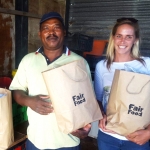News
Philanthropy is nothing new to Annalina Kazickas, one of six Dr. Joseph and Alexandra Kazickas' granddaughters. Few years ago Annalina spent some time with Hoops4Hope program in Zimbabwe and even introduced her younger brother Peter to it. South Africa and its people have been a huge part of her life but Annalina's passion for nature, helping others and her creative mind lead her to the Urban Farm/Garden in Vilnius.
"For those of you who don’t know, my grandfather, Dr. Joseph Kazickas, was an avid gardener," shares Annalina. "He took such pride in his fruit and flower gardens and visiting him inevitably included a walk through the garden, critically analyzing each plant and marveling in the beauty that is inherent in nature. It was only recently that I became aware of the plethora of benefits associated with gardening and have since become involved in urban farming and vegetable box delivery schemes in my community.
Besides the obvious benefits of eating healthy, connecting with our food source, and supporting small, local farmers, I soon became aware of the more subtle benefits associated with urban farming and gardening to our physical and mental wellbeing. In a world increasingly characterized by an urban, indoor and sedentary lifestyle, connecting with nature and getting your hands dirty is becoming rarer and thus, even more important. Gardening and working with nature supports the cognitive, emotional and behavioral developments in children, and can develop a sense of purpose, teach responsibility and offer a calming outlet for stress. Especially in areas where community interactions are limited, urban farming can help foster a sense of community and camaraderie, work to build relationships, and create a space where strangers become friends.
Depression, suicide, and substance dependence and abuse are huge issues for Lithuanians. When I was given the opportunity to support an organization through the KFF, finding an organization that would keep the spirit of my grandparents alive and would provide real benefits to a community were important to me. As I began researching organizations in Lithuania, I immediately came across the Vilnius Urban Farm, the first urban farm in the country. Their goals – to develop a sense of community, involve local schools, and support various technological innovations, to name a few – is exactly what can encourage and support emotional and physical health. I truly hope that the Vilnius Urban Farm becomes the first of many such initiatives in the country."
Vilnius Urban Garden started with a small group of community members and green activists in 2012. Now it includes about 10 active members plus wider base of supporters. Small support from municipal community funds grew into the largest urban garden initiative in Lithuania (maybe Baltics as well). Now it doubles in size annually and includes a greenhouse as well. It's a non-profit, volunteer based, community focused organisation that puts primary focus on the process and believes in shared work - shared harvest idea. Vilnius Urban Garden plans to launch new gardens with other communities, engage municipality and it’s companies, search for new linkages: schools, restaurants, public and private sectors with a bigger than just a garden purpose - to build strong communities.
Top Photo: Annalina with a farmer delivering his vegetables to veggie box subscribers in Cape Town / Courtesy of Annalina Kazickas
|
|
|
Bottom Photos: Vilnius Urban Farm




